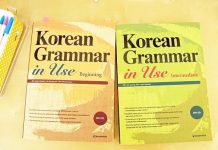 가: 오늘 왜 안경을 안 썼어요?
가: 오늘 왜 안경을 안 썼어요?
Why didn’t you wear your glasses today?
나: 아침에 안경을 책상 위에 올려 놓고서 잊어버리고 그냥 나왔어요.
I placed my glasses on my desk this morning and then just left, leaving them behind.
가: 어제 수영을 하다가 발에 쥐가 나서 아주 힘들었어요.
Yesterday, I was swimming and got a cramp, and it really hurt.
나: 그러니까 운동을 할 때는 꼭 준비운동을 하고서 해야 돼요.
That’s why you have to do warm-up exercises (first) and then exercise.
This expression is used to indicate that the first action was completed before the subsequent action started. Moreover, there is a before-and-after relationship between the actions in the preceding and following clauses. This expression can only be used with verbs.
 * 저는 아침마다 조깅을 하고서 학교에 옵니다.
* 저는 아침마다 조깅을 하고서 학교에 옵니다.
Every morning, I go running (first) and then come to school.
* 책을 읽고서 친구들과 토론을 했어요.
I read a book and (after that) had a discussion with some friends.
1. This expression cannot be used with the tense-indicating expressions -았/었- or -겠.
• 인사만 했고서 헤어졌어요. (X)
인사만 하겠고서 헤어지려고 해요. (X)
->인사만 하고서 헤어졌어요. (〇)
2. Both the phrases -고 and -고 나서 can be used to indicate the order of events.
• 책을 읽고서 감상문을 썼어요.
= 책을 읽고 감상문을 썼어요.
= 책을 읽고 나서 감상문을 썼어요.
>> You can click on the title of each grammar below to learn about the other grammar which also expresses ‘Time and Sequential Behavior’:
01 만에
02 -아/어 가지고
03 -아/어다가
04 -고서
>> Full of Intermediate grammar: Click here


![[Korean grammar] -(으)ㄴ/는 척하다 Expressing Habits and Attitudes](https://sayhikorean.com/wp-content/uploads/2021/10/1_94.1.jpg)
![[Korean grammar] -기는요 Expressing Habits and Attitudes](https://sayhikorean.com/wp-content/uploads/2021/10/1_93.1.jpg)
![[Korean grammar] -곤 하다 Expressing Habits and Attitudes](https://sayhikorean.com/wp-content/uploads/2021/10/1_92.1.jpg)
![[Korean grammar] -았/었어야 했는데 Expressing Regret](https://sayhikorean.com/wp-content/uploads/2021/10/1_91.1.jpg)
![[Korean grammar] -(으)ㄹ걸 그랬다 Expressing Regret](https://sayhikorean.com/wp-content/uploads/2021/10/1_90.1.jpg)
![[Korean grammar] -(으)ㄹ 뻔하다 Expressing Hypothetical Situations](https://sayhikorean.com/wp-content/uploads/2021/10/1_89.1.jpg)
![[Korean grammar] -았/었더라면 Expressing Hypothetical Situations](https://sayhikorean.com/wp-content/uploads/2021/10/1_88.1.jpg)
![[Korean grammar] -(느)ㄴ다면 Expressing Hypothetical Situations](https://sayhikorean.com/wp-content/uploads/2021/10/1_87.1.jpg)
![[Korean grammar] -아/어 봤자 Expressing Futility](https://sayhikorean.com/wp-content/uploads/2021/10/1_86.1.jpg)
![[Korean grammar] -(으)나 마나 Expressing Futility](https://sayhikorean.com/wp-content/uploads/2021/10/1_85.1.jpg)
![[Korean grammar] -고 말다 Expressing Completion](https://sayhikorean.com/wp-content/uploads/2021/10/1_83.1.jpg)